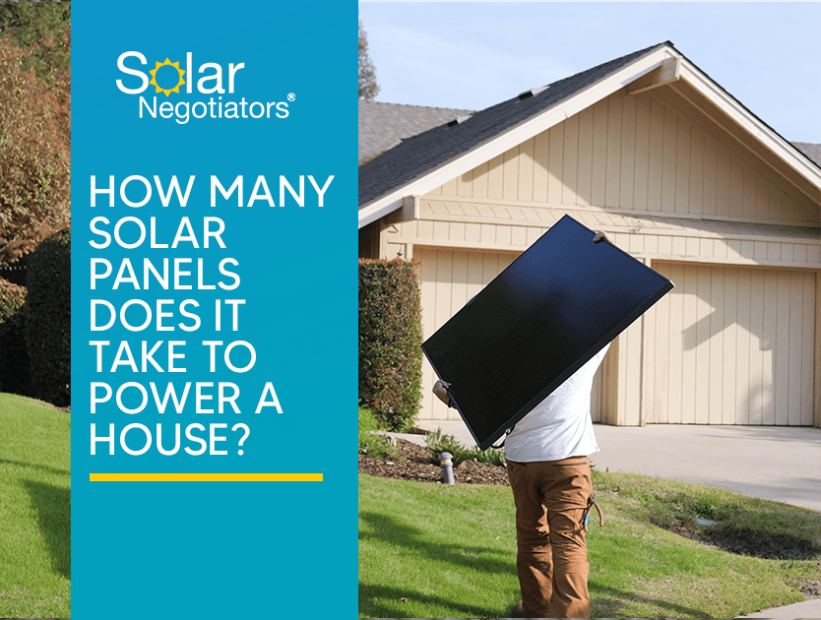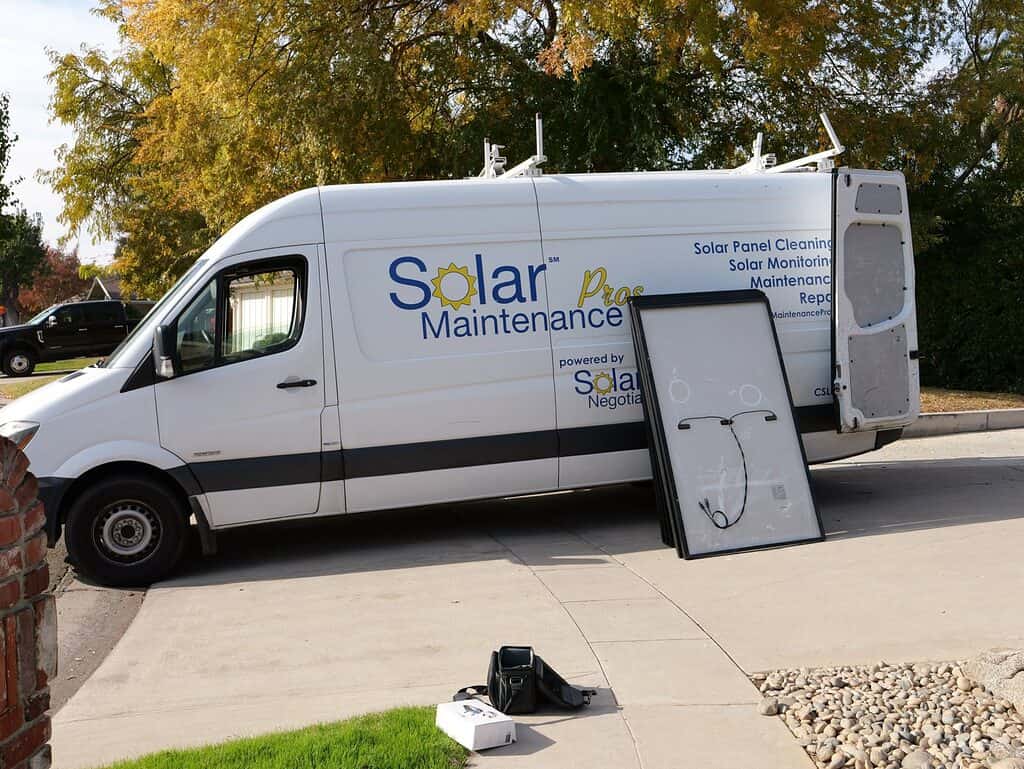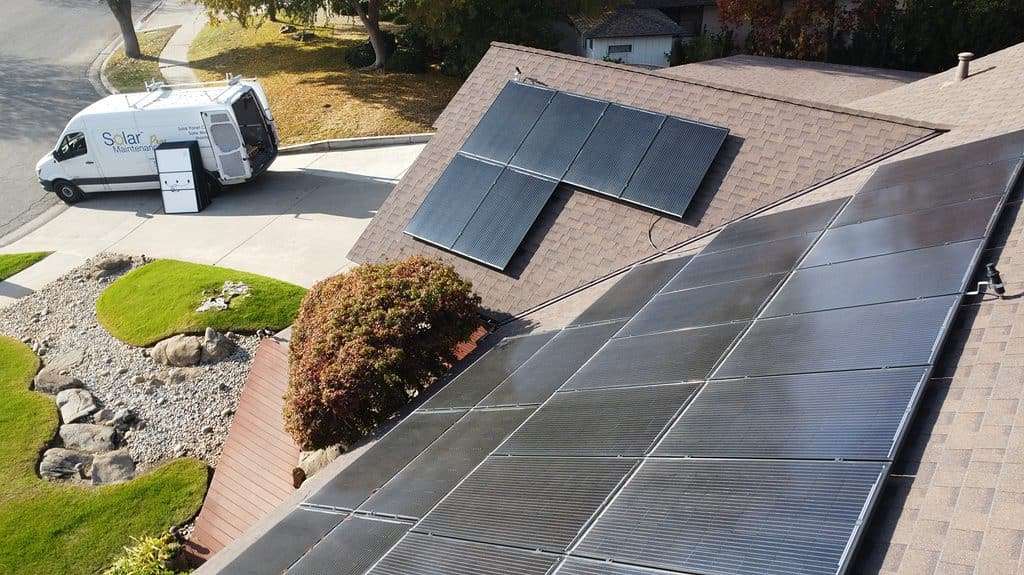
How Many Solar Panels Does It Take to Power a House?
Rising in popularity in recent decades, solar panels have become the new norm for houses in the U.S. If you’re considering making the switch, it is important to understand how many solar panels it takes to power your home. Solar Negotiators will show you the steps to calculate how many panels you might need to offset your energy costs and the top reasons why you should make the switch to solar.
What determines how many panels I need?
Before you start the installation process, there are many things to consider when determining how many solar panels it takes to power your home. You’ll need to factor in how much energy your home uses, how much sunlight your roof gets, how much roof space you have, and the orientation of your roof. In this article, we’ll break all of these items down for you.
Your energy usage
When considering solar panels, it is important that your solar professional obtains your electricity consumption from your last twelve utility bills. In most cases, you should see the total amount of electricity at the bottom of the bill in kilowatt-hours (kWh), so your solar consultant can determine how much power you need to generate each month.
Hours of sunlight
Ideally, you want your solar panels to get as much sunlight as possible. That’s why your solar consultant needs to make sure your solar panels face the direction that gets the most sunlight. On average, you’ll want your solar panels to receive about four or five hours of sunlight to offset your usage. This is a key factor when calculating how much solar energy your panels can generate.
Space needed
The primary indicator of how much energy you can generate on your roof is the size of the roof. The more electricity you want to produce, the more roof space you’ll need for your installation. If you have limited roof space, high-efficiency solar panels let you install fewer modules while still covering your energy needs.
Panel wattage
People often think all solar panels are the same. But they aren’t created equally. When you are choosing solar panels, ensure you know the wattage of the panels you’re installing. Panel wattage is the amount of electricity emitted from the panel. Most solar panels on the market range between 250 to 400 watts of power. To learn more about what solar panels are top rated by our business, read The Top Solar Panels of 2022.

Can a house run 100% off solar?
The question above is one of the most frequently asked questions regarding solar power. Running a house completely off solar panels alone is nearly impossible. Most solar panels are grid-tied, which provides energy to the house. To power your home, you need to install both solar and battery storage. You should know that one battery can only help power the major appliances of a home for a few hours. This is because the current storage capacity on battery systems is limited. However, multiple battery storage systems can be added to a home to power you through the event of an outage.
How many solar panels do I need?
To determine how many solar panels you need to power your house, you need to know:
- How much energy your household uses
- How much space on your roof
- How many hours of sun your home gets
- The solar panels’ wattage
Here are the steps you need to take to determine the number of solar panels you need to power your home:
- Measure your annual kWh usage or the annual electricity consumption of your house. For example, the average American household is estimated at 10,649 kWh.
- Figure out your panel wattage, which is how much electricity your panels produce. For example, we are going to use 320 watts as an estimate.
- Estimate your production ratio. Look at how much electricity your panel produces based on the average sunlight it gets throughout the day. You must divide your system’s wattage by its electricity output in a year. If not, you can use the U.S. estimate between 1.3 and 1.6.
- Plug the data into the formula: Panel number = kWh usage/production ratio/wattage.
For example, we will say your house has an estimated 12,500 kWh consumption. Assuming a production ratio of 1.3 and 320-watt panels, you would need:
12,500 kWh / 1.3 / 320 = 33 panels total.

Can I determine how many panels based on square footage?
Trying to figure out how many solar panels you need based on square footage is difficult. The cost of a system depends not on how large a home is, but on a homeowner’s energy consumption habits. It’s easy to assume that houses of similar sizes would need similar-sized solar systems, but that is just not the case. Providing an accurate solar estimate based on a home’s size would be difficult because other factors can impact the price.
What are the different solar incentives?
California is one of the top states in the U.S. for home solar. When combined with the 30% Federal Solar Investment Tax Credit (ITC) and the state’s net metering policy, solar is a great investment option into future savings for California homeowners. The price of having solar panels installed will depend on your location, panel prices of solar panels, and your electricity demand.
Get a quote today!
Before you pull the trigger on solar, make sure you get a competitive quote from our team at Solar Negotiators. Comparing pricing with multiple companies ensures you get the best deal possible. Call our team today to schedule a consultation and find out how many solar panels you need for your home today!

Recent Posts
Latest Solar Tax Credit News: Bill Signed To Eliminate 30% Solar Tax Credit
Solar Tariffs – Are They Here To Stay?
Solar Backup Solutions: How Do Solar Batteries Work?
Reduce your reliance on the energy grid.
Get Solar In
Your Inbox

Refer friends and get paid in-app
The more referrals you bring in, the higher your earnings.
Earn $1,000 for each referral, and bonuses of up to $1,500 once you hit your 10th referral.




